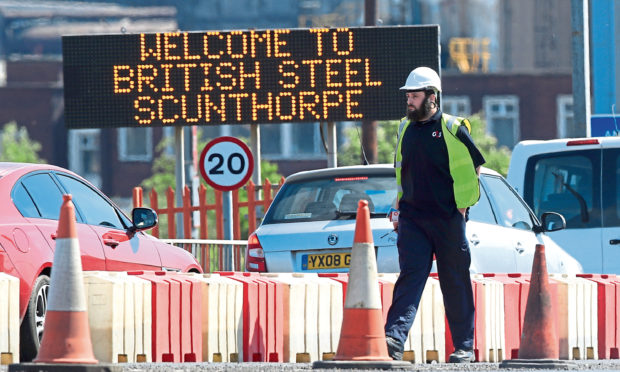What to do with an empty airport?
An open-air bowling alley, a skate park for particularly healthy teenagers, or a site for a car boot sale?
Suggestions are still welcome by the Scottish Government, five years after it purchased Prestwick for £1.
In the meantime, it has cost you and me £70 million to maintain.
There is always a good reason not to let major infrastructure or industries fail – jobs are lost.
To stand by smacks of rubber-necking at a road accident – it’s only proper to stop and offer help.
Unfortunately, the private sector know this, and often tout their failures in front of government in the hope of getting a cheque.
This only works with heavy things – steel, concrete, coal, cars or ships.
Were Jamie Oliver to seek government support for his failing restaurant chain, he’d be laughed out of Whitehall.
While food is vital for national security, it’s hard to argue that pesto is, too, no matter that 1,000 jobs are at stake, not to mention those affected in the supply chain.
Instead, national security is seen as a valid reason to keep steel foundries open and shipyards alive – a vague future is imagined where we are under attack and will need to mass produce weapons.
Also at play is a sense of authenticity.
Working in a steel mill is a “real” job, with sweat, sparks and constant danger.
Life in Jamie’s kitchen might be the same, but probably not.
A steel job is superior in the hierarchy of proper work.
This explains why manufacturing – a much smaller sector than services or leisure in the UK economy – receives special treatment.
And so, British Steel is asking for cash from you and me, for the second time in as many months.
Smart move to give it such an evocative name – it sounds established – but has only existed since 2016, when venture capitalists bought the Scunthorpe works for £1 from Tata Steel.
Since owning it, Greybull Capital has made a substantial profit from the steel operation by virtue of charging it large “management fees” and lending it money at a high rate of interest.
Greybull Capital is not composed of hard-hatted men, covered in dust and sweat, risking life by working between molten metal and heavy machinery.
Instead, it is made up of Marc Mayohas and Daniel Goldstein, who have extracted £33m from the company in their short ownership.
These are very wealthy people who are asking the British public to keep their wealth-generating business alive.
For the sake of 5,000 jobs, the government is taking the request seriously.
Earlier this year, Greybull Capital/British Steel received £100m of our money in aid, in order to pay an EU carbon fine (which only came about because of Brexit).
Greybull Capital is now asking for a further £30m, reduced from an initial request for £75m.
The UK Government has been understandably slow to grant this second tranche of money.
Reports suggest (the talks are not public) that Whitehall smells a rat – a company which may be too quick to look for public money when it has plenty of its own. We can’t know this for sure until either side goes public on the negotiation.
Jamie Oliver has publicly apologised to his staff and suppliers, and closed his restaurants after injecting £13m of his own money in a rescue bid.
It is not clear if Marc Mayohas and Daniel Goldstein have offered any of their money to help British Steel.
Greybull is registered for tax in Jersey, one of the UK’s inshore tax havens.
Thus two millionaires are asking the taxpayer for a loan, when their own company actively avoided paying standard UK tax.
Labour has suggested nationalising British Steel, a prospect the Treasury doesn’t warm to, as it knows the lesson of Prestwick.
The problem for the UK Government, and for devolved ones in the same boat, is that rescuing British Steel or its like looks a lot like bailing out the super rich, who have shown no loyalty to Britain or its people.
It would continue the precedent of public money magically being available for failed private sector ventures.
Which would continue a culture in the private sector of taking a punt on a failed business, profiteering from its death and then handing over the corpse for the public to bury.
Right now Britain’s main steel manufacturer, Tata Steel, is limping away from failed merger talks and is looking for a future.
Meanwhile, the British car manufacturing industry has seen production and profits slump – Jaguar Land Rover reported losses of more than £3 billion.
It’s not all to do with Brexit – the US/China trade war and China’s domestic problems have made life difficult for everyone.
But British manufacturing faces the added problem of adjusting to an uncertain market and the removal of EU aid.
Rescue British Steel today and there will be a long queue of others wanting something similar.
Remember Prestwick, an empty runway paved with good intentions.




